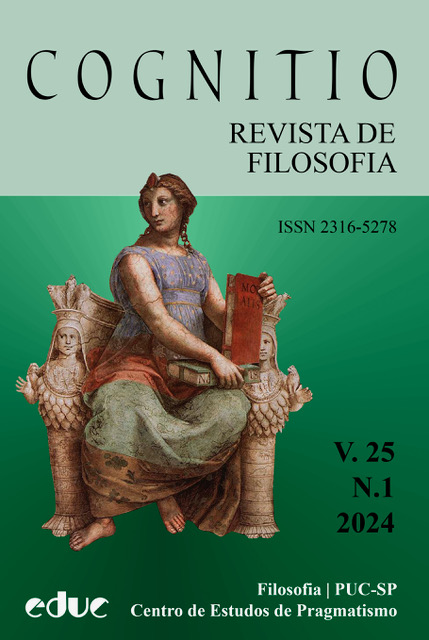Estrutura, sentido-ingrediente e estratégia assertórica
ouvindo Michael Dummett para interpretar a herança da filosofia de Frege
DOI:
https://doi.org/10.23925/2316-5278.2024v25i1:e66007Palavras-chave:
Asserção, Estrutura, Sentido, Sentido-ingredienteResumo
Neste artigo, revisitaremos uma motivação para considerar as vantagens de uma teoria sobre conteúdos estruturados sobre uma semântica de mundos possíveis. Argumentaremos que uma estrutura representa a organização estratégica do conteúdo de “p” sob condições nas quais afirmá-lo não implica consequências contraditórias. Estas são as condições vencedoras para a asserção de ‘p’. Quando ‘p’ é modalmente sensível – pode alterar os seus parâmetros de sucesso – o conhecimento da estrutura representará o ponto racional para asserções (sobre realidades não actualizadas) que são organizadas para maximizar o que pode ser deduzido de ‘p’. Nestes casos, a estrutura relevante conhecida é intensional. Argumentaremos que a Semântica do Mundo Possível actualista, que procura a conversão do conhecimento intensional numa representação de re de estados possíveis, paga o preço de ficar cega às divergências estruturais; e só consegue explicar muito mal estas divergências estruturais entre estados de informação não reais e correlacioná-las com a divergência entre estratégias vencedoras de afirmação. Nosso argumento começará expondo o legado de Frege; recorrer ao conceito de sentido-ingrediente de Dummett como alternativa ao conhecimento de segundo grau (grade-two) de Kripke; e passar brevemente por uma estratégia semântica de Stalnaker e Thomason para representar asserções modais. Além destes autores exploraremos a contribuição de Russell, Kaplan e Ecthemendy para o nosso argumento.Referências
DUMMET, M. The Interpretation of Frege’s Philosophy. Harvard University Press. 1981.
DUMMET, M. The Logical Basis of Metaphysics. Harvard University Press. 1993.
DUMMETT, M. Truth. Proceedings of the Aristotelian Society, v. 59, n. 1, p. 141-162, 1959. https://doi.org/10.1093/aristotelian/59.1.141
ETCHEMENDY, J. The Concept of Logical Consequence. Cambridge Massachusetts. Harvard University Press, 1999.
FREGE, G. Sense and Reference. The Philosophical Review, v. 57, n. 3, p. 209-230, 1948. https://doi.org/10.2307/2181485
FREGE, G. Posthumous Writings. Chicago: University of Chicago Press. Translated by P. Long and R. White. 1979.
KAPLAN, D. How to Russell a Frege-Church. The Journal of Philosophy, v. 72, n. 19, p. 716-729, 1975. https://doi.org/10.2307/2024635
KNEALE, W; KNEALE, M. The Development of Logic. Clarendon Press, 1962.
KRIPKE, Saul. Naming and Necessity. Cambridge, MA: Harvard Press, 2001.
MARCUS, R. B. Modalities: philosophical essays. New York: Oxford University Press. 1961.
READ, S. Harmony and modality. In: DÉGREMONT, C.; KIEFF, L.; RÜCKERT, H. (Eds.). Dialogues, Logics and Other Strange Things: Essays in Honour of Shahid Rahman. London: College Publications. 2008. p. 285-303.
RUSSELL, Bertrand, On Denoting. Mind, New Series, v. 14, n. 56, p. 479-493, 1905. https://doi.org/10.1093/mind/XIV.4.479
STALNAKER, R.; THOMASON, R. Modality and Referece. Noûs, v. 2, n. 4, p. 359-372, 1968. https://doi.org/10.2307/2214461
Downloads
Publicado
Como Citar
Edição
Seção
Licença
Copyright (c) 2024 http://creativecommons.org/licenses/by/4.0/

Este trabalho está licenciado sob uma licença Creative Commons Attribution 4.0 International License.









